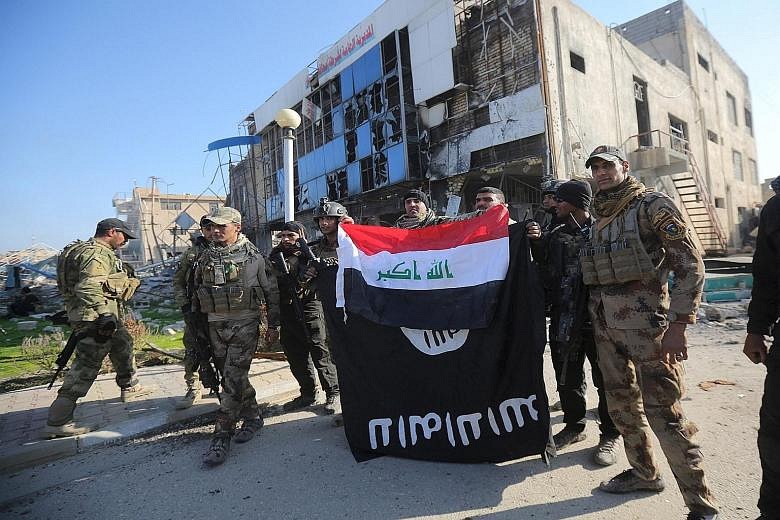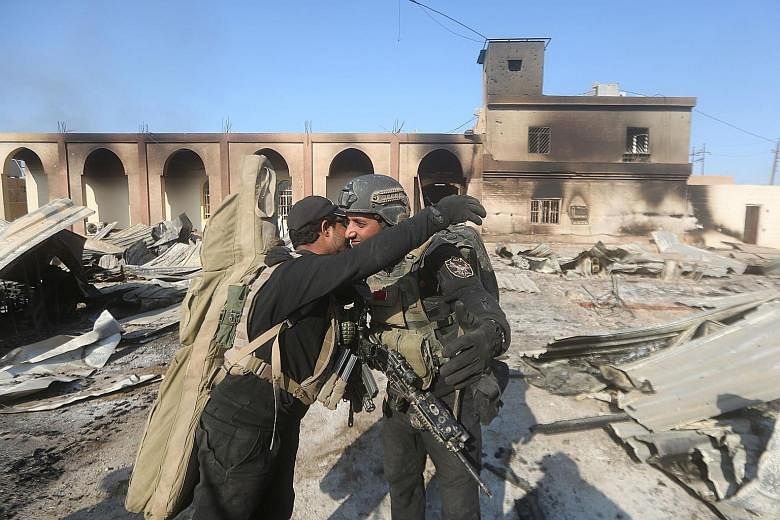BAGHDAD • A triumphant Iraqi Prime Minister Haider al-Abadi declared the coming year would see his forces defeat Islamic State in Iraq and Syria (ISIS), after his military achieved its first major victory since collapsing in the face of the militant fighters 18 months ago.
Iraqi forces flew the national flag above the main government complex in Ramadi earlier on Monday, declaring they had recaptured the city, a provincial capital west of Baghdad, which fell to ISIS in May.
"2016 will be the year of the big and final victory, when Daesh's presence in Iraq will be terminated," Mr Abadi said in a speech broadcast on state television, using an Arabic acronym for ISIS. "We are coming to liberate Mosul and it will be the fatal and final blow to Daesh."
-
Areas retaken from, still under ISIS' grip
-
Following the Iraqi forces' victory in Ramadi, here is a recap of key places in Iraq and Syria seized by the Islamic State in Iraq and Syria (ISIS) group or recaptured from them.
Ramadi: This Sunni Arab city 100km west of Baghdad is the capital of Anbar, the country's largest province.
ISIS seized Ramadi in mid-May. Iraqi troops retook the south-western side of the city on Dec 8 with support from US-led air strikes, reaching the city centre on Dec 22. They drove ISIS militants from their last stronghold on Sunday.
Tikrit: Located 160km north of Baghdad, it was recaptured in April by Iraqi troops, police and Shi'ite-dominated paramilitaries. The operation was helped by the fact that much of Tikrit's civilian population had fled the city.
Sinjar: Iraqi Kurdish forces backed by coalition strikes recaptured Sinjar, 400km north-west of Baghdad, from ISIS on Nov 13. That cut a key supply line to areas held by ISIS militants, who had captured Sinjar in August last year and carried out a brutal campaign against the Yazidi minority.
Baiji: This Sunni Arab town around 200km north of Baghdad and a nearby refinery, Iraq's largest, were recaptured by Iraqi forces in mid-October.
Baiji lies at a major crossroads and its recapture was seen as key to offensives in Anbar and, later, Mosul.
Mosul: Iraq's second-biggest city and capital of Nineveh province, it is 350km north of Baghdad. ISIS still controls the city, since seizing it on June 10 last year.
Raqqa: A north-eastern city with 300,000 inhabitants, Raqqa has been ISIS' de facto Syrian capital since January last year. It is a major target of US-led coalition forces.
Palmyra: This ancient Syrian city 205km east of Damascus was taken by ISIS on May 21. The group has destroyed archaeological sites here that were on Unesco world heritage sites.
Kobane: A Kurdish city on the Turkish border. ISIS fighters were driven out of Kobane on Jan 26 after over four months of fierce fighting with Kurdish forces backed by US-led air strikes.
AGENCE FRANCE-PRESSE
Mosul, northern Iraq's main city, is by far the largest population centre in the self-proclaimed caliphate ISIS rules in Iraq and Syria.
The army's apparent recapture of Ramadi marks a major milestone for US-trained forces who crumbled when ISIS fighters charged into Iraq in June last year. In previous battles since then, Iraq's armed forces operated mainly in a supporting role beside Iranian-backed Shi'ite militias.
US President Barack Obama received an update on Monday on the Iraqi forces' progress in Ramadi, the White House said. "The continued progress of the Iraqi security forces in the fight to retake Ramadi is a testament to their courage and determination, and our shared commitment to push ISIL out of its safe havens," the White House said in a statement, using another acronym for ISIS.
Congratulating the Iraqi government, US Defence Secretary Ash Carter said: "The expulsion of ISIL by Iraqi security forces... is a significant step forward in the campaign to defeat this barbaric group."
American officials said the US-led coalition backing Iraqi forces had carried out more than 630 air strikes in the area over the past six months and provided training and equipment.
The US-led coalition, which includes major European and Arab powers, has been waging an air campaign against ISIS positions in both Iraq and Syria since a third of Iraqi territory fell to the militants in mid-2014.
The Iraqi army was humiliated in that advance, leaving fleets of American armoured vehicles and other weapons in the militants' hands. One of the main challenges since then has been rebuilding Iraq's army into a force capable of capturing and holding territory.
Baghdad has said for months it would prove its forces' rebuilt capability by rolling back militant advances in Anbar, a mainly Sunni province encompassing the Euphrates River valley from Baghdad's outskirts to the Syrian border.
After encircling the provincial capital for weeks, Iraqi forces launched an assault to retake it last week. Their progress had been slowed by explosives planted in streets and booby-trapped buildings.
The authorities gave no immediate death toll from the battle for the city, but added that most residents were evacuated before the assault.
Finance Minister Hoshiyar Zebari said the capture of Ramadi was "a done deal", but said the government had to do more to rebuild the city and encourage displaced people to return.
"The most important thing is to secure it (Ramadi) because Daesh can bounce back," he said.
Iraq's army took the lead in the battle for Ramadi, with the Shi'ite militias prominent in other campaigns held back from the battlefield to avoid antagonising the mainly Sunni population.
Mr Abadi took office in September last year after the ISIS advance, pledging to reconcile Iraq's warring sectarian communities.
His government plans to hand over Ramadi to local police and a Sunni tribal force once it is secured, to encourage Sunnis to resist ISIS, which is made up of hardline Sunnis.
Such a strategy would echo the US military's "surge" campaign of 2006 to 2007, which relied on recruiting and arming Sunni tribal fighters against a precursor of ISIS.
REUTERS


